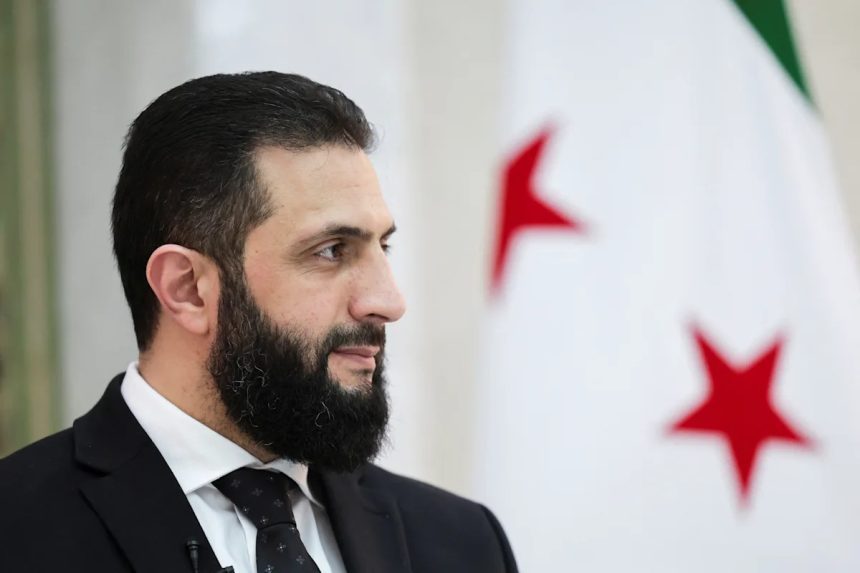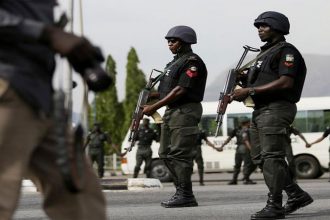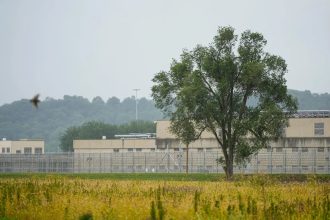Syria’s President Ahmed al-Sharaa has said that security talks with Israel are a “necessity” and could lead to results in the “coming days”.
Al-Sharaa, who led the force that overthrew former President Bashar al-Assad in December, ending the country’s 13-year war, made the comments to reporters on Wednesday.
Israel responded to al-Assad’s overthrow by declaring that a 1974 security agreement with Syria had collapsed, and increased the amount of Syrian territory Israel controlled, as well as ramping up air attacks in Syria, killing several Syrian soldiers over the past few months.
The United States, which has backed Syria’s new authorities, has attempted to broker a deal between Syria and Israel.
However, al-Sharaa said that the US had not pressured Syria to make a deal with Israel, and was instead acting as a mediator.
The Syrian president added that the potential agreement between Israel and Syria would need to respect Syria’s airspace, which Israel has repeatedly violated for years, as well as Syria’s territorial integrity. He added that the United Nations would need to monitor any agreement.
A security agreement could lead to other agreements being reached, al-Sharaa said, but a normalisation agreement between the two countries was not currently on the table.
Israeli intervention
Israel’s most recent ground incursion in Syria came on Sunday, when Israeli soldiers carried out searches in the towns of Saysoun and Jamlah, in southeastern Deraa.
The day before, al-Sharaa had confirmed that talks with Israel had begun, in an attempt to restore the 1974 agreement, which followed the 1973 war between Israel and Syria.
Syria failed to retake the occupied Golan Heights, which Israel had taken in 1967, in that war. A demilitarised buffer zone was established as part of the 1974 agreement, but Israel violated the agreement by seizing the buffer zone and areas outside it after the fall of al-Assad.
Israel has also bombed targets across Syria, including the Ministry of Defence in Damascus in July. That month, Israel supported Druze militiamen in Suwayda against local Bedouin tribal fighters and Syrian government forces sent to end fighting between the Druze and the Bedouins.
In his comments to reporters on Wednesday, al-Sharaa said that Israel and Syria had been “four to five days” away from reaching a security agreement before the violence in Suwayda in July.
Al-Sharaa added that Israel had conducted more than 1,000 air strikes and more than 400 ground incursions in Syria since the December 8 overthrow of al-Assad, actions he described as “very dangerous”.
Israel has framed that intervention as being in support of the Druze, a minority also present in Israel, and part of an Israeli demand that Syrian government forces not be present in areas south of Damascus up to the border with Israel.
The Israelis have also emphasised al-Sharaa’s past membership of al-Qaeda, despite the Syrian president’s shedding of those associations.
The news outlet Axios reported on Tuesday that Israel’s demands during negotiations with Syria included the demilitarised zone southwest of Damascus, as well as a no-fly zone in that area, in exchange for an Israeli withdrawal from all of the land it has seized in Syria since December, except for an outpost on the summit of Mount Hermon.
Al-Sharaa confirmed that Israel wanted to remain on Mount Hermon. He added that Syria wanted a deal similar to the 1974 agreement, and said that it was not yet time to discuss the fate of the Israeli-occupied Golan Heights outside of the buffer zone, which Israel illegally annexed in 1981.









